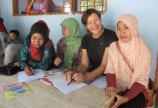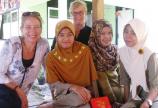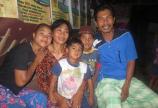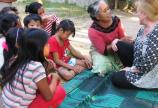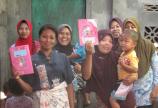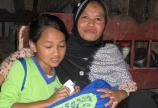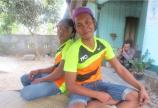Legacy of statelessness for migrant families
Human and Social Development, Social Sciences
- Tara Sharpe
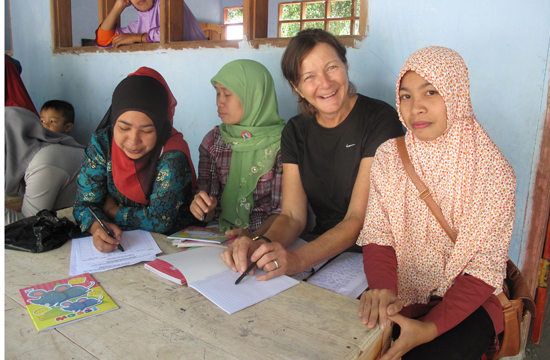
Heartbreaking headlines dominate the news around the world in continuing coverage about the predicament of migrants from Africa, Asia and the Americas seeking lives in new countries. What gets less attention are challenges faced by the millions of families caught up in undocumented migration for temporary work, especially those in the Asia-Pacific region. A new study by UVic researchers points to simple solutions that could have great impact.
Among the growing number of labour migrants worldwide, the stream of undocumented workers from Indonesia to Malaysia and the Middle East is one of the largest; but people know very little about the family experiences of labour migrants.
A two-year pilot study by Dr. Leslie Butt (Centre for Asia-Pacific Initiatives, Dept. of Anthropology) and Dr. Jessica Ball (School of Child and Youth Care), and collaborator Dr. Harriot Beazley (Human Geography, at the University of the Sunshine Coast in Australia), closely explores the risks of statelessness and other impacts of undocumented parent migration in Southeast Asia on the children who are either left behind, carried along, or born while mothers are working overseas.
The research focuses on parental decisions about registering the births of children, and the difficulties that families on the move confront when seeking birth documentation for their children.
‘Statelessness’ is a multi-generational pattern
Birth registration is the first step towards citizenship. “And the process can be unnecessarily and prohibitively complex,” explains Ball. Lack of birth registration is often part of a multigenerational legacy of statelessness. Many children of parents who migrate for work lack citizenship in any country because their parents lack sufficient documentation and resources to prove their child’s right to citizenship, even when they are born in Indonesia.
“Unless steps are taken to simplify birth registration procedures and to make it more accessible to parents who are poor, rural and moving across borders for work, inequities between children who are citizens and non-citizens will endure,” says Ball.
“There is a high degree of precarity. We could argue that the most vulnerable populations in the world are children born to mothers out of country and out of wedlock, and children who are vulnerable are more likely to be trafficked.”
“And there just hasn’t been the research on parent choices and decisions,” points out Butt.
By talking to migrant parents of stateless children about their experiences with birth registration and their goals for family cohesion and quality of life, the researchers learned of challenges and solutions to birth registration from the participants themselves.
The insights from the UVic-led study, “Stateless Children, Parents, and Undocumented Migration: An Indonesian Pilot Study,” identify strategies to help migrant families to establish children’s identity documentation.
One child’s story
Those participants included Melati’s family. The father of 15-year-old Melati (pictured above) left for work in Malaysia before she was born and, as a result, her mother was not able to register her birth. Melati’s father eventually returned to their village with a new wife and two young sons and, by then, Melati had a new father figure—the man her mother met when she was forced to migrate overseas herself to earn money to support her family. Melati lived with her grandmother while her mother was away.
She told the researchers that soon she too will have to seek work overseas: because she has no documentation, she couldn’t enroll in secondary schools and has no job skills. Without a birth certificate, she can’t apply for a passport, and will migrate without documentation, becoming exposed to dangerous migration, work and living conditions overseas. This pathway is common among rural Indonesian families who must travel far from home in unsafe conditions to find a livelihood.
“Migration destabilizes family unity,” says Butt, “and migration is often the family’s last choice. Virtually every person we spoke to would prefer to stay home, not migrate. This is the first study to talk to parents of stateless children and to learn from their insights about their reasons and experiences with registering their children.”
The study found that mothers lack the social position and resources to complete the birth registration process. With many fathers forced to find work overseas before their child’s birth, the birth registration process needs to be simplified so that mothers and even grandparents (who often care for children of migrant parents) can successfully complete the process themselves.
Pathways to citizenship for all children
Another one of the study’s recommendations is for a greatly simplified and no-cost birth registration process to be integrated in the network of widely used government birthing clinics and primary health care programs in local villages.
“Multigenerational statelessness amplifies the risks to safety, health and quality of life of children who are already vulnerable,” Ball says. “The global push to ensure every child’s right to an officially documented name and nationality needs to consider the limited resources and access to birth registration in families who are constantly on the move.”
“At the same time, some families may prefer to remain undocumented and beyond the reach of government surveillance. Research that encompasses diverse family perspectives can identify pathways to citizenship for all children.”
“We need to move away from place-based thinking,” adds Butt. “With so many families on the move in the global era, birth registration policies will need to adapt. Family needs come first, and Indonesia can take a leadership role in making birth registration easy for all families.”
Next steps
In December 2015, both researchers will return to Indonesia to help the partner organizations such as UNICEF, PLAN and Save the Children explore ideas and apply the UVic research to possible strategic initiatives in that country.
The two-year study was supported through CAPI and by a 2013 Insight Development Grant from the Social Sciences and Humanities Research Council of Canada.
More info
---
On June 11 to 13, 2015, CAPI presented an international conference at UVic examining transnational migration from both academic and activist perspectives. Visit the earlier UVic news tip here.

